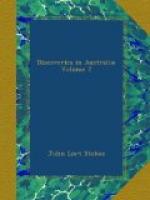Southerly and westerly winds brought us in sight of Madagascar on the 16th, and on the same evening, aided by a southerly current of 2 knots an hour, we were just able to weather its South-East extreme. The features of this great island that were presented to our view approached the Alpine, and from a passing glimpse of the small hills near the shore, it appeared to be a fertile country. This portion of the globe is one of great interest to the world at large, especially when we know that, if considered as a naval or military station, it is scarcely equalled by any in the Indian Ocean; besides having a soil of the best description, and abounding also in mineral wealth, with timber fit for any purposes, and thousands of cattle running wild in its valleys. On the afternoon of the 27th we were within seven or eight miles of the land, near the great Fish River, on the south-eastern coast of Africa, having apparently got within the eddy of the westerly current, which sweeps round that part of the coast at the distance of thirty miles with a velocity of from two to five miles an hour, which we entirely lost after passing Algoa Bay. Within thirty miles of the latter place we had a strong gale from the southward of twenty-four hours duration; and on the morning of the 1st of July arrived at Simon’s Bay, in company with Her Majesty’s ship Belleisle, which sailed two days before us from the Mauritius. Nearly six years had elapsed since our last visit, and little improvement had taken place in colonial affairs.
(Footnote. The little difficulty that strangers found in recognizing this anchorage at night, is now overcome by a light-vessel being placed near the Roman Rocks; but the streaks of sand, resembling snow, down the sides of the hills over Simons Bay, and the remarkable break in the high land over another bay, just to the northward, are sufficient guides of themselves in clear weather.)
On the 9th we were again on our way homeward. Touching at St. Helena* and Ascension, we crossed the equator on the forenoon of the 15th, in longitude 19 degrees 45 minutes West, where we endeavoured to obtain soundings with 2000 fathoms of line, which parted at 1600 fathoms. Respecting deep-sea soundings, there are some sceptical persons who, in consequence of the bottom not being brought up from the great depths reported to have been found, are inclined to doubt that soundings were actually obtained on those occasions.
(Footnote. This place is famed for its large flying-fish, of which some are from 18 to 24 inches in length: and not a little so, for those monsters of the finny tribe called sharks. In the Admiralty book of directions, the fact is related of an artillery-man being found fully accoutred in the stomach of one taken there.)
ARRIVAL IN ENGLAND.




